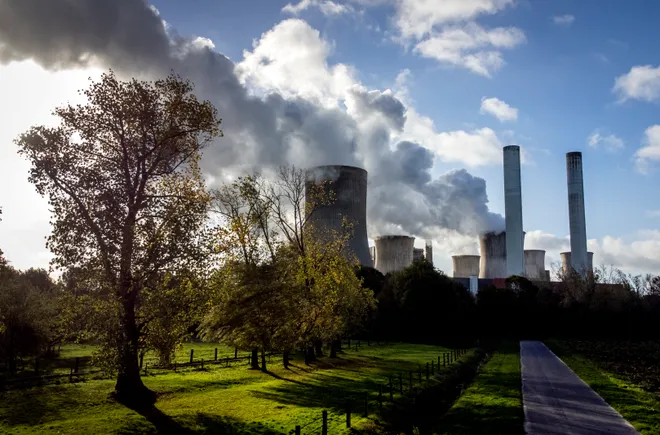Global carbon emissions set record high, but US coal use drops to levels last seen in 1903

It's been another record-breaking year for carbon dioxide (CO2) emissions from fossil fuels, European researchers reported in a new study released early Tuesday in Dubai.
While fossil emissions have decreased in the U.S. and in Europe during 2023, they have risen overall worldwide – and scientists say global action to cut these fuels is not happening fast enough to prevent dangerous climate change.
“The impacts of climate change are evident all around us, but action to reduce carbon emissions from fossil fuels remains painfully slow,” said Pierre Friedlingstein, of the University of Exeter’s Global Systems Institute, who led the study.
Specifically, the annual Global Carbon Budget projects fossil CO2 emissions of more than 36.8 billion metric tons in 2023, which is a rise of 1.1% from 2022. “We are clearly not going in the right direction,” he said.
In addition, researchers said that at the current emissions level, there's a 50% chance that global warming will exceed 1.5 degrees Celsius (2.7 degrees Fahrenheit) consistently in about seven years. “It now looks inevitable we will overshoot the 1.5°C target of the Paris Agreement, and leaders meeting at COP28 will have to agree rapid cuts in fossil fuel emissions even to keep the 2°C target alive,” Friedlingstein added.

What are fossil fuel emissions?
Human activities from the burning of fossil fuels such as coal, oil and gas release greenhouse gases such as carbon dioxide, which has caused the temperature of Earth's atmosphere to rise to levels that cannot be explained by natural causes, scientists say.
CO2 is called a "greenhouse gas" because of its ability to trap solar radiation and keep it confined to the atmosphere.
This year, the burning of fossil fuel and manufacturing of cement have added the equivalent of putting 2.57 million pounds of carbon dioxide into the atmosphere every second.
Which fossil fuels are being emitted?
According to the report:
- CO2 emissions from coal use are expected to grow 1.1% in 2023, reaching a record high and exceeding the temporary peak in 2014. The growth in coal is driven by China and India, with drops in coal use in the U.S. and Europe.
- CO2 emissions from oil use are expected to grow 1.5%, primarily due to an increase in international aviation and ground transportation in China. CO2 emissions from oil use remain below their 2019 levels before the COVID-19 pandemic hit in 2020.
- CO2 emissions from natural gas use have grown a sustained 2% per year over the last 10 years but this growth has stopped since the Russian invasion of Ukraine. Emissions from gas use are expected to grow a small 0.5% in 2023. The increased growth in China is largely offset by the decline in the European Union.
Which countries and industries are producing CO2 emissions?
- Fossil CO2 emissions in China are projected to grow 4.0% in 2023. Growth in 2023 is partly caused by a delayed rebound from significant COVID-19 lockdowns in China in 2022.
- In India, fossil CO2 emissions are projected to increase 8.2% in 2023. Growth in coal is largely driven by high growth in demand for power, with new renewables capacity far from sufficient to meet this growth.
- Fossil CO2 emissions in the U.S. are projected to decrease by 3.0% in 2023. A sharp decline in coal is largely driven retirements of coal-fired power stations and cheaper natural gas. The rise in natural gas consumption in the power sector is largely offset by reduced heating demand resulting from milder winter temperatures in 2023. "Emissions from coal use in the US have now dropped to levels last seen in 1903,” said Robbie Andrew, a senior researcher at CICERO, a climate research institute in Norway.
- For the first time in this year’s global carbon budget, scientists separate the growth caused by international aviation and shipping. International aviation and shipping combined are projected to increase by 11.9% in 2023.

'Increasingly serious and growing impacts'
“Global emissions at today’s level are rapidly increasing the CO2 concentration in our atmosphere, causing additional climate change and increasingly serious and growing impacts,” said Corinne Le Quéré, a professor at the University of East Anglia’s School of Environmental Sciences.
“All countries need to decarbonize their economies faster than they are at present to avoid the worst impacts of climate change," she said.
The Global Carbon Budget report, produced by an international team of more than 120 scientists, provides an annual, peer-reviewed update on the status of CO2 emissions. The 2023 edition (the 18th annual report) was published in the journal Earth System Science Data.

Contributing: The Associated Press
Disclaimer: The copyright of this article belongs to the original author. Reposting this article is solely for the purpose of information dissemination and does not constitute any investment advice. If there is any infringement, please contact us immediately. We will make corrections or deletions as necessary. Thank you.







